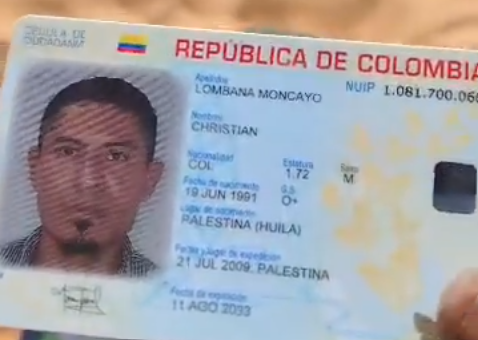ADF STAFF
After a recent battle between the allies of the Sudanese Armed Forces (SAF) and the paramilitary Rapid Support Forces (RSF), fighters found a cache of unexpected documents. Among them were the passport, driver’s license and other documents belonging to a Colombian mercenary.
In a video posted to the social platform X, formerly Twitter, a man in military fatigues speaks in Arabic as he records each document, all of them belonging to a 33-year-old Colombian corporal born in the Palestinian territories.
“These are the people who are killing us,” one man says in the video.
About 160 Colombian fighters were part of a caravan traveling from Libya into Sudan in mid-November when they were attacked by the SAF-aligned Joint Force of Armed Movements of Darfur. The fighting injured the corporal, whose documents Joint Force fighters released through their video.
The Colombian fighters who were attacked had traveled eight days across the desert from Benghazi, Libya, to support the RSF, according to Colombia-based La Silla Vacía, a news website.
The SAF and RSF spent much of 2024 locked in combat over control of the city of el-Fasher and North Darfur, the only part of the Darfur region to remain out of the RSF’s hands since war broke out in April 2023.
La Silla Vacía acquired additional video and audio recordings from the Colombian mercenaries and spoke directly with some. The fighters reported that they had been sent to Sudan against their will. They said they had been hired by a Colombian company, International Services Agency A4SI (Academy for Security Instruction), to be security guards at oil fields in the United Arab Emirates. After arriving in the UAE, they learned that they would be shipped to Libya. From there, they were sent to Sudan to join the RSF.
One group of Colombian mercenaries was attacked in October a short distance from el-Fasher. Among the dead was Diego Edison Hernández, whose family told the Colombian publication Semana that a private military contractor had recruited him to be a drone pilot. They had little more information about how he died or when his body would be returned to Colombia.
According to Military Watch magazine, the Colombian contractors were financed by the UAE, which remains allied with the RSF and, according to the United Nations, continues to supply it with weapons and support despite official statements to the contrary.
The documents discovered by Joint Force fighters confirmed that the Colombian mercenaries arrived in the UAE in October. In early December, the SAF reported that suicide drones had killed more than 20 Colombians in the Darfur region.
Sudan is the latest war zone in which Colombian mercenaries have come under attack. They also have fought in Ukraine, Yemen and Haiti, where they participated in the assassination of Haitian President Jovenel Moise in 2021.
The Colombian mercenaries are just the latest guns for hire to join the brutal battle for Sudan. Other mercenaries have come from the Central African Republic, Chad and Niger. Russia’s Wagner Group, now known as Africa Corps, supplied the RSF with weapons across the Libyan border early in the war.
Mercenary recruitment experts told Spain’s El País newspaper that the Colombians’ experience is typical among a new breed of small organizations that often portray themselves as security companies rather than military contractors.
“The last link in the chain are almost always those known in the industry as ‘third-country nationals,’ who come from Colombia, Perú, El Salvador, Somalia, or Nigeria,” Ulrich Petersohn, an expert in mercenary recruitment at the University of Liverpool told El País. “Without solid passports or money for plane tickets, they are entirely dependent on what the agencies want to do with them.”
For retired Colombian Soldiers, contracts can represent as much as five times their retirement pay, making the offer tempting.
Columbian leaders decried the presence of Colombian mercenaries in Sudan. Foreign Minister Luis Gilberto Murillo promised Sudanese officials that Colombia would guarantee the return of its citizens fighting in Sudan.
Colombia recently signed onto the United Nations’ 1989 convention banning the recruitment and training of mercenaries, making it only one of 30 countries to do so. Colombia’s Congress recently passed a measure outlawing organizations that exploit retired military personnel.
Mario Urueña, an expert in global security at the Universidad del Rosario in Bogotá, told El País that the U.N. convention, while lacking widespread support, “goes in the right direction, which is to criminalize the leaders who exploit people.”

